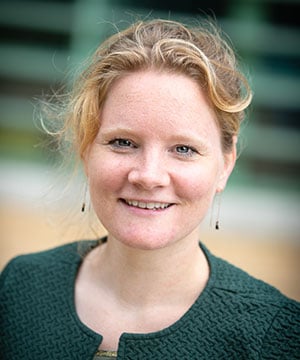Grant title: Balancing dietary protein and fibre intake to improve outcomes of colorectal cancer treatment
Institution: Wageningen University
Grant awarded: September 2025
Optimising dietary intake is considered an important strategy to prepare for cancer surgery. Whereas some guidance on protein intake is available, we do not know whether and how the pre-operative intake of protein should be balanced with other dietary components. With the support of this grant from Wereld Kanker Onderzoek Fonds and World Cancer Research Fund International, we will study the role of dietary protein and dietary fibre in relation to short- and long-term outcomes of cancer treatment. These insights may ultimately help to formulate specific recommendations for people who will undergo cancer surgery – Dr Dieuwertje Kok
Background
Individuals with bowel cancer may benefit from adopting a healthy lifestyle to lower the risk of complications and improve health outcomes. As part of a healthy lifestyle, adequate intake of dietary protein is important. However, the optimal intake of dietary protein is not clear, especially when intake of other dietary components, such as fibre, is low.
There is some evidence that with a disturbed balance in protein and fibre intake, bacteria in the bowel can produce compounds that potentially disturb the recovery process. We will investigate whether improving the balance between protein and fibre intake may help to support recovery after treatment, thereby improving quality of life and overall health.
Aims and objectives
The overall aim of this project is to unravel the role of dietary protein and fibre intake in relation to short- and long-term health outcomes in individuals with bowel cancer.
Specifically, we aim to:
- study the relation between intake of protein and fibre before surgery and the occurrence of complications or return of the cancer after surgery;
- study the relationship between compounds detected in the blood and the occurrence of complications or return of the cancer after surgery;
- perform a clinical study in which participants with bowel cancer before surgery will receive a diet high in protein, with varying amounts of fibre, to verify whether this can result in a more favourable profile of compounds produced by the bacteria.
How it will be done
First, we will use data from the COLON study, which is an existing study among individuals with bowel cancer. Participants have been involved in the definition and prioritisation of research topics, which led to the identification of “nutrition and cancer treatment” as an important theme for research.
More than 2,100 individuals participated in the COLON study. They donated blood samples and provided information on dietary habits using questionnaires at multiple timepoints after their diagnosis. Using this information, we will study whether specific dietary habits (including protein and fibre intake) and the presence of related compounds in the blood are linked to complications after surgery and return of the cancer.
To confirm whether changing dietary habits may result in the presence of more favourable compounds in the blood, we will also conduct an intervention study, in which participants will receive a diet rich in protein, further supplemented with extra dietary fibre or a placebo. For this part of the project, we will recruit 50 participants with bowel cancer.
Potential impact
We will learn more about the importance of balancing the intake of dietary protein and fibre in individuals with bowel cancer. These insights can help to further define programmes that support individuals with cancer in optimising their nutritional intake and thereby improving outcomes of cancer treatment.
